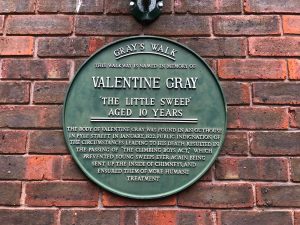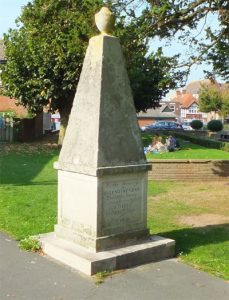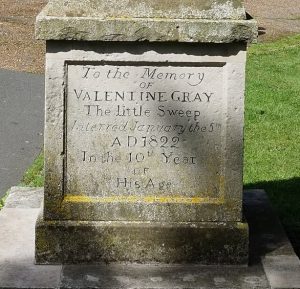 Here is another sad story of a Victorian chimney sweeps apprentice or climbing boy. You might remember that The Guild of Master Sweeps recently played a part in memorialising the death of George Brewster who died trapped in a chimney at Fulbourn County Pauper and Lunatic Asylum in February 1875.
Here is another sad story of a Victorian chimney sweeps apprentice or climbing boy. You might remember that The Guild of Master Sweeps recently played a part in memorialising the death of George Brewster who died trapped in a chimney at Fulbourn County Pauper and Lunatic Asylum in February 1875.
John Valentine Gray was apprenticed to chimney sweep Benjamin Davies in Newport but in 1822, at the age of only ten, he died at the hands of his master, who was later convicted of manslaughter. He did not die in a chimney but there is no doubt that his unhealthy lifestyle and the inhumane treatment received from his employer contributed to his early death.
In 1822 a nine-year-old boy, Valentine Gray, who was one of the many chimney climbing boys, was found dead in the filthy outhouse pertaining to a public house of ill-repute known as The Rum Puncheon (no longer standing). He had been forced to sleep in one of the numerous slum alleys radiating off Pyle Street in Newport, Isle of Wight. His body was undernourished and emaciated. A medical examination showed that his body was covered with bruises and at his inquest, his death was reported as due to ‘a severe blow or blows to the head’ – the verdict was “Manslaughter against Davis (his master) and his wife.” Benjamin and Margaret Davis stood trial at the Lent Assizes 1822 at Winchester Crown Court – Davis was found guilty and sentenced to one year’s imprisonment; his wife was acquitted. Davis was imprisoned for the offence but strangely, only until he had paid a fine of one shilling.

Valentine had been born into a poor family in Alverstoke in Hampshire and Benjamin Davis had taken him out of the Poor House there in October 1821 to be an apprentice Sweep. Valentine had lived in the workhouse from lived from 6 months of age after the death of his mother. Public concern about the use of children as sweep’s apprentices had been aroused years earlier by Jonas Hanway, London philanthropist. National publicity about Valentine Gray’s death added weight to the campaign which led eventually to the Climbing Boys Act of 1834. This was hardly a watershed for it merely specified that no children under ten were to be so employed. Further Acts were passed by parliament but not until 1840 were there regulations forbidding use of chimney sweeps under the age of twenty one. Even this act was not really effective as employers ignored it, finding it inconvenient to function without small climbers. Eventually police were given powers to prosecute and in 1875 the tribulations of Valentine Gray’s successors were at last at an end.
On the Island, compassion, (or possibly a sense of guilt and shame), led to a public subscription being organised by John Matthews of Pyle Street for the erection of a memorial in the burial ground of the parish church of St Thomas’, Newport. You might think, given the brutality of the crime, that Davis was made an example of but despite being found guilty of manslaughter his sentence was a one-shilling fine (5p in today’s money) and this sparked public outrage.



 My name is Paddy McKeown, I am a retired police officer (Detective Sergeant – Metropolitan Police), turned chimney sweep. I have completed training with ‘The Guild of Master Chimney Sweeps’, and Rod Tech UK (Power Sweeping).
My name is Paddy McKeown, I am a retired police officer (Detective Sergeant – Metropolitan Police), turned chimney sweep. I have completed training with ‘The Guild of Master Chimney Sweeps’, and Rod Tech UK (Power Sweeping).




Comments are closed.